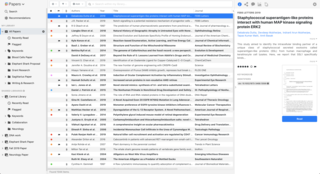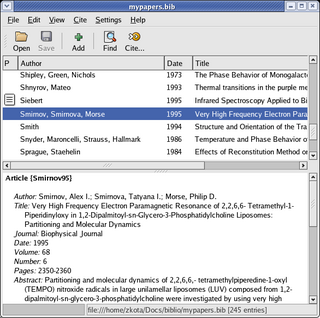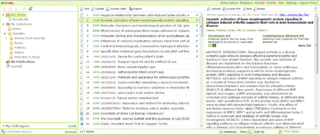 W
W2collab was a scientific social network by Elsevier, launched in 2007 and discontinued on 15 April 2011.
 W
WBibBase is a free web-service for creating and maintaining publication pages. BibBase takes its input from a BibTex file or from DBLP, Zotero, BibSonomy, or Mendeley. It produces both HTML renderings, which can be embedded into an existing web page, as well as RSS feeds that allows others to subscribe to updates about new publications from the user.
 W
WBibDesk is an open-source reference management software package for macOS, used to manage bibliographies and references when writing essays and articles. It can also be used to organize and maintain a library of documents in PDF format and other formats. It is primarily a BibTeX front-end for use with LaTeX, but also offers external bibliographic database connectivity for importing, a variety of means for exporting, and capability for linking to local documents and automatically filing local documents. It takes advantage of many macOS features such as AppleScript and Spotlight.
 W
WBibSonomy is a social bookmarking and publication-sharing system. It aims to integrate the features of bookmarking systems as well as team-oriented publication management. BibSonomy offers users the ability to store and organize their bookmarks and publication entries and supports the integration of different communities and people by offering a social platform for literature exchange.
 W
WCitavi is a program for reference management and knowledge organization for Microsoft Windows published by Swiss Academic Software in Wädenswil, Switzerland. Citavi is very widely used in Germany, Austria, and Switzerland, with site licenses at most universities, many of which offer training sessions and settings files for Citavi.
 W
Wcolwiz is a free web, desktop and mobile based research management software, designed by researchers from the University of Oxford. colwiz incorporates reference management, collaboration and networking tools, as well as productivity features.
 W
WEndNote is a commercial reference management software package, used to manage bibliographies and references when writing essays and articles. It is currently produced by Clarivate Analytics.
 W
WJabRef is an open-sourced, cross-platform citation and reference management software. It uses BibTeX and BibLaTeX as its native formats and is therefore typically used for LaTeX. The name JabRef stands for Java, Alver, Batada, Reference. The original version was released on November 29, 2003.
 W
WMendeley is a company based in London, UK, which provides products and services for academic researchers. It is most known for its reference manager which is used to manage and share research papers and generate bibliographies for scholarly articles.
 W
WOpen Rev. is a web-based platform for open discussion and annotation of research publications and related material. Researchers can comment directly on text, formulas, and images in research papers, post related questions and answer questions posed by each other. Open Rev's web-based PDF viewer has been implemented to encourage public discussion and open peer review of scientific publications. User contributions are licensed under Creative Commons Attribution-ShareAlike 3.0 Unported.
 W
WPaperpile is a web-based commercial reference management software, with special emphasis on integration with Google Docs and Google Scholar. Parts of Paperpile are implemented as a Google Chrome browser extension. It was founded in 2012, and is produced by Paperpile LLC.
 W
WPapers is a reference management software for Mac OS X and Windows, used to manage bibliographies and references when writing essays and articles. It is primarily used to organize references and maintain a library of PDF documents and also provides a uniform interface for document repository searches, metadata editing, full screen reading and a variety of ways to import and export documents.
 W
WPybliographer is a reference management software tool that deals with bibliographic databases, used for viewing, editing, searching, and reformatting bibliographies. Written in Python and licensed under GNU GPL, it provides a scripting framework of classes and functions, which makes it extendable to many other applications. Documentation is available.
 W
WQiqqa is a freeware and freemium reference management software that allows researchers to work with thousands of PDFs. It combines PDF reference management tools, a citation manager, and a mind map brainstorming tool. It integrates with Microsoft Word XP, 2003, 2007 and 2010 and BibTeX/LaTeX to automatically produce citations and bibliographies in thousands of styles.
 W
WRefME was a free citation management tool available on web, iOS and Android. It offered a functionality that allowed users to scan book and journal barcodes with a mobile device and generate citations automatically. It was compatible with other citation management tools such as Mendeley, Zotero, RefWorks, and EndNote and enables exporting in over 7000 citation styles. In May 2015, the company released a Chrome plug-in to allow for direct clipping of web sources, which was followed in August 2015 by a similar iOS extension. RefME was shut down on March 7, 2017, after being acquired by the education company Chegg, Inc..
 W
WTropy is a free and open-source desktop knowledge organization application that helps users manage and describe photographs of research materials. It was developed by the Center for History and New Media at George Mason University. Photos imported into Tropy can be combined into single items, described with metadata that is applied in bulk or created with custom metadata templates, annotated with research notes, and tagged in accordance with a researcher's preferred mode of organization.
 W
WWizFolio was a web-based reference management software for researchers to manage, share their research and academic papers and generate citations in scholarly writings. It used plug-ins to collect bibliographic information, videos and patents from webpages. WizFolio ceased to be available at the end of 2017.
 W
WZotero is a free and open-source reference management software to manage bibliographic data and related research materials. Notable features include web browser integration, online syncing, generation of in-text citations, footnotes, and bibliographies, as well as integration with the word processors Microsoft Word, LibreOffice Writer, and Google Docs. It is produced by the Center for History and New Media at George Mason University.